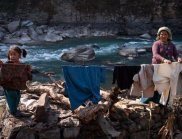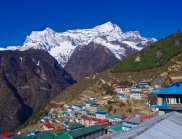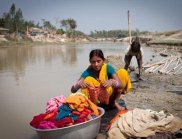Australia extends its expertise in water resource management to Asia
CSIRO and its partners have begun work in the Koshi River Basin which stretches from China, across the Himalayas through Nepal and discharges into the Ganges River in India.
The Koshi Basin is home to millions of people who rely on its fertile floodplains for their livelihoods. There is growing pressure to address development challenges in the Basin, in particular population growth and an increasing demand for energy, whilst working within constraints of natural hazards exacerbated by a changing climate, such as floods, drought, landslides, sediment movement and debris flow.
“There is much the Australian water experience will bring to this project to help improve sustainable development and climate resilience, reduce water stress, and inform water-related decision making and transboundary issues.”
Dr Carol Couch, CSIRO Water for a Healthy Country Flagship Director
In a collaborative four-year project, scientists from CSIRO’s Water for a Healthy Country Flagship will provide technical assistance to the International Centre for Integrated Mountain Development’s (ICIMOD) Koshi Basin Programme. CSIRO scientists will develop an integrated basin-wide modelling system to improve management of the Koshi River Basin. This system will incorporate information on water availability, freshwater environments and the ecosystem services they provide and social considerations such as the effect of changes in water availability on livelihoods. The system will contribute to development in the Koshi Basin in a socially and environmentally sustainable manner and support national and transboundary water reforms.
“Australia has a long history of managing a scarce and variable water resource, and sharing this resource amongst competing users,” said CSIRO’s Water for a Healthy Country Flagship Director, Dr Carol Couch. “There is much the Australian water experience will bring to this project to help improve sustainable development and climate resilience, reduce water stress, and inform water-related decision making and transboundary issues. We will draw on the suite of large river basin assessments undertaken across Australia in recent years, such as the Murray-Darling Basin Sustainable Yields assessment.
“Research will be undertaken as a partnership between Australian organisations and ICIMOD researchers, based in Nepal. We will also be learning from ICIMOD, particularly in relation to sediment movement, snow melt and glacial processes,” said Dr Couch.
“At ICIMOD, we have taken a long-term, transboundary approach to support river basin management. This includes testing, piloting, and monitoring the innovations needed to address common issues related to climate change, cryosphere, water resources management and livelihood promotion,” said Dr David Molden, Director General of ICIMOD.
“The Koshi Basin Programme will provide a platform for national and international researchers and decision makers to come together to promote transboundary cooperation and integrated water resource management practices and policies. This will also include the development of measures for risk management as well as equitable access to water for energy and food security,” said Dr Molden.
Work undertaken by CSIRO this year will consist of a review and analysis of the existing knowledge base, capacity building and the development of a prototype model for the Koshi River Basin that incorporates information on water, climate, hydropower, freshwater environments, irrigation and social issues including poverty alleviation. The knowledge gained from this project will culminate in the development of a robust integrated basin-wide modelling framework, using eWater’s hydrological modelling platform, Source.



